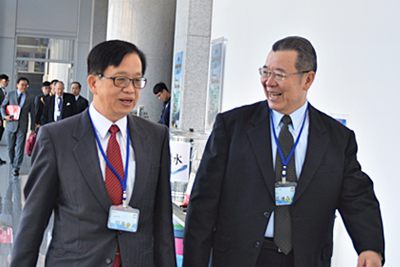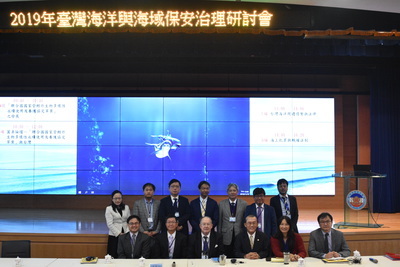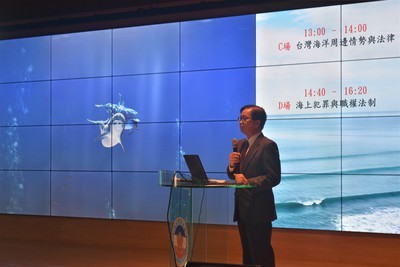2019 Seminar on Taiwan’s Ocean and Maritime Security Governance
Nowadays, all coastal and island nations are extremely concerned about their jurisdiction of territorial water and the management in human activities. This trend has motivated two concepts of ocean management; one is the Ocean Governance, and the other is the Maritime Security Governance. On the one hand, global, regional and sectional organizations pass many structures and arrangements of international laws, especially aiming at high sea and deep seabed, to achieve the goal of ocean governance. The United Nations also called an intergovernmental conference to draft “The Agreement on the United Nations Convention on the Law of Sea on the Conservation and Sustainable Use of Marine Biological Diversity of Areas Beyond National Jurisdiction”, which further limits the rule of freedom of the High Seas that is made known in the United Nations Convention on the Law of the Sea in 1982.
On the other hand, it also brings about many new regulations, such as management of planning ocean conservation zones and implementation of assessing the environmental impacts, for the various activities in the area. These are the traditional but vacuous rules that existed in the United Nations Convention on the Law of the Sea. With more mature practice in nations, they increasingly become new global-framed implements. Besides, there are some ocean conflicts around Taiwan owing to sovereignty dispute, new-formed transnational maritime crimes, new law-enforcing and arms race on the marine among related countries in Asia and the new East Asia page where China has combined coastguard with police system.
Faced with the trends of the developments in ocean governance and the changes of the environments in maritime security governance, related authorities, including the Ministry of the Interior, Central Police University, the Ocean Affairs Council and the Fisheries Agency, especially hold ‘’2019 Seminar on Taiwan’s Ocean and Maritime Security Governance’’ on November 12th and 13rd. They invite domestic and international renowned experts and scholars from the U.S., Japan, and Korea, to discuss the following topics:
First, Draft of the Agreement on the United Nations Convention on the Law of Sea on the Conservation and Sustainable Use of Marine Biological Diversity of Areas Beyond National Jurisdiction and Taiwan.
Second, Marine Situation around Taiwan and the Laws.
Third, Maritime Crimes and Legal System of the Authority.
Fourth, the Change of Coastguard Mission and Education.
Fifth, Marine Order and Fishery.
Sixth, Assertion on South China Sea, Precaution to Conflicts and Management of Maritime Space.
Deputy Secretary of the Ministry of Interior, Chiu, Chang-Yueh, on behalf of the minister, made a speech as the honored guest. He pointed out the importance of the ocean and its roles played to humans. At the same time, Deputy Secretary Chiu commented on the destruction of human activities to the ocean and his worry about its threat posed to human existence in the future. He also illustrated the efforts and the significant concrete achievement which our government has done for the ocean to the domestic and international experts, scholars and participants. Such as the so-called “the three bills of the homeland”, including the Spatial Planning Act, the Coastal Zone Management Act, and the Wetland Conservation Act, the new-established Ocean Affair Council under the Executive Yuan in 2017, and the Ocean Basic Act which just passed in November 1st this year. Lastly, Deputy Secretary Chiu expected that all the participants should not degenerate “Ocean Nation” to a slogan but carry it out as a specific action, and he mentioned that the result of the seminar will be brought into the administrative reference of the Ministry of Interior.
During the two-day seminar, it aroused many speeches and discussions, from the ways to work in practice, the trends of international developments to the conditions based on every country’s theory, with abundant contents as well as in diverse aspects. It provides precious materials of academic research and administrative reference for the internal ocean and maritime security governance, perfectly achieving the original idea of the organizer and the co-organizer.



